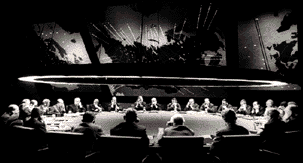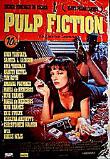BLACK
COMEDY
 Black
comedies have a dark and cynical tone characteristic of comedies that became
popular during the 1940s, with films like Arsenic and Old Lace (1944).
The plots of these films usually revolve around some grotesque, violent, and
taboo subject matter. They became popular again in the 1960s when Stanley Kubrick's
Dr Strangelove (1964) and Mike Nichols's Who's Afraid of Virginia
Woolf (1966) were successful both at the box office and with critics. Some
recent examples include Robert Altman's The Player (1992), Quentin Tarantino's
Pulp Fiction (1994) and Barry Sonnenfeld's Get Shorty (1995).
Black
comedies have a dark and cynical tone characteristic of comedies that became
popular during the 1940s, with films like Arsenic and Old Lace (1944).
The plots of these films usually revolve around some grotesque, violent, and
taboo subject matter. They became popular again in the 1960s when Stanley Kubrick's
Dr Strangelove (1964) and Mike Nichols's Who's Afraid of Virginia
Woolf (1966) were successful both at the box office and with critics. Some
recent examples include Robert Altman's The Player (1992), Quentin Tarantino's
Pulp Fiction (1994) and Barry Sonnenfeld's Get Shorty (1995).
Using laughter as a formidable
defense against the absurd complexities of modern life, black comedy is essentially
entertainment as survival tactic, injecting humor into situations that might
otherwise be unbearable. Nothing is sacred in a genre that dares to poke fun
at the unthinkable, and black comedy gleefully violates taboos with abandon.
Although grim humor has been a part of movies since the early silent era , the
genre didn't begin to define itself until the late 1940s and 1950s, when British
comedies—in what would become a continuing and popular tradition—used
elegant style and literate writing to cross previously well-guarded moral boundaries.
A classic case in point is Kind Hearts and Coronets (1949), in which
a disgruntled aristocrat sets out to eliminate the relatives who block his inheritance
to a dukedom, all eight of whom are played by Sir Alec Guinness in a memorable
multiple-role performance. With shocking wit and amoral detachment, the film
dared to suggest that murder can be fun, skewering upper-crust British snobbery
while leading viewers to sympathize with a heartless killer. Sir Alec Guinness
would later star in The Ladykillers (1955), another British classic featuring
a seemingly harmless old woman who skillfully dispatches a band of bumbling
robbers. Both films attracted controversy for what some pereceived as a lapse
of commonn decency, but black comedy was officially here to stay. Among American
black comedies, Stanley Kubrick's Dr. Strangelove and Clockwork Orange
(1971) have become classics.
British comedy never
got much blacker than it did in Monty Python and the Holy Grail (1975),
which lampooned the legend of King Arthur to draw humor from the black plague,
witch hunts, graphic dismemberment, foul bodily functions and a variety of similarly
distasteful subjects.
Monty Python veteran Terry Gilliam continued the tradition of irreverence in
his own films, particularly the brilliant Brazil (1985), where Gilliam's
unique sense of the absurd was well-suited to combat the Kafkaesque bureaucratic
madness of a future dystopia.
Hollywood has produced
a number of memorable black comedies, including What Ever Happened to Baby
Jane? (1962), with its portraits of fading Hollywood glamor; the outrageousness
of war as depicted in M*A*S*H (1970); the inventively twisted pursuit
of suicide in Harold and Maude (1972); and the confusion between movies
and reality in The Stunt Man (1980) and Get Shorty.
Not surprisingly, some
of the blackest American comedies have come from the fringes of independent
filmmaking, where humor is less confined by popular trends and commercial consideration.
Maverick director Paul Bartel gained instant cult status with Eating Raoul
(1982), which took a deadpan approach to it droll plot involving serial
killing, robbery, and nonchalant cannibalism. John Waters moved into the studio-supported
mainstream without compromising his uniquely twisted sensibilities. His black
comedy Serial Mom (1994) maintained the director's reputation for breaking
taboos with its attack on "family values" and suburban conformity.
The Coen brothers have
also demonstrated a wealth of macabre wit and visual flair, particularly in
Blood Simple (1984), Barton Fink (1991), and The Hudsucker
Proxy (1994). On a more rebellious level, Michael Lehman's Heathers
(1989) took on the touchy subject of teen suicide with its scathing satire of
peer pressure and high-school status-seekers. These titles offer a small sample
of a genre which offers an antidote to priggishness often invoked in the name
of "decency" and "good taste."
 Black
comedies have a dark and cynical tone characteristic of comedies that became
popular during the 1940s, with films like Arsenic and Old Lace (1944).
The plots of these films usually revolve around some grotesque, violent, and
taboo subject matter. They became popular again in the 1960s when Stanley Kubrick's
Dr Strangelove (1964) and Mike Nichols's Who's Afraid of Virginia
Woolf (1966) were successful both at the box office and with critics. Some
recent examples include Robert Altman's The Player (1992), Quentin Tarantino's
Pulp Fiction (1994) and Barry Sonnenfeld's Get Shorty (1995).
Black
comedies have a dark and cynical tone characteristic of comedies that became
popular during the 1940s, with films like Arsenic and Old Lace (1944).
The plots of these films usually revolve around some grotesque, violent, and
taboo subject matter. They became popular again in the 1960s when Stanley Kubrick's
Dr Strangelove (1964) and Mike Nichols's Who's Afraid of Virginia
Woolf (1966) were successful both at the box office and with critics. Some
recent examples include Robert Altman's The Player (1992), Quentin Tarantino's
Pulp Fiction (1994) and Barry Sonnenfeld's Get Shorty (1995).